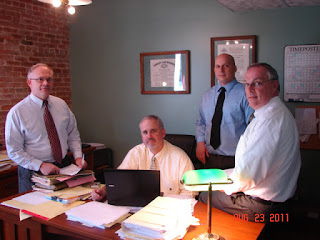In New York, license renewal is required first, five years after the first license and then every eight years after that.
But New York State's Vehicle and Traffic Law does have a catch-all: "If the Commissioner [of Motor Vehicles] has reasonable grounds to believe that a person holding a license is not qualified to drive a motor vehicle, the Commissioner may require such person to submit to an examination to determine their qualification."
While there is no mandate to report someone to the Department of Motor Vehicles, typically, such reports come from physicians, police or concerned family members. If you are a family member who has concerns about the abilities of an elderly driver suffering from poor and uncorrected vision, dementia or related cognitive conditions, or just plain bad driving, you can report to the Department of Motor Vehicles on a form DS-7. A physician may make a report to the DMV on form DS-6.
There is no definitive standard to prove or disprove that an elderly person should have his or her license revoked. Family members are very reticent to contact the DMV to have a mother, father, aunt or uncle or grandparent approached by the Department of Motor Vehicles and have their license revoked. There is a tremendous loss of control and elderly driver necessarily confronts once the license is lifted. Social contacts and independence becomes a challenging way of life without the freedom that driving one's own car brings.
Moreover, physicians in New York State are seemingly under added pressure to report obvious cases of elderly drivers who are incapable of driving but still choose to drive. Recently a Court of Appeals case, Davis v. South Nassau Community Hospital found that a medical professional was liable to the public at large. Similarly in the State of California an 85 year old woman was driving and steering her car into oncoming traffic. The doctor treating her for dementia did not contact California's DMV about the dementia. The family brought suit against the doctor for failing to take action against the driver's license of the 85 year old.
Our firm can assist you if you have been hurt by a driver who just should not have been in control of a car. We serve Northern New York State, which includes Watertown, Massena, Canton, Potsdam, Tupper Lake, Saranac Lake, Malone, Chateaugay, Plattsburgh and all villages in between.
As a proud card carrying member of AARP, I'd suggest that if you or a loved one, or a patient or a friend have doubts about someone's ability to drive you read this fine article by clicking on this link:
Joe Nichols








